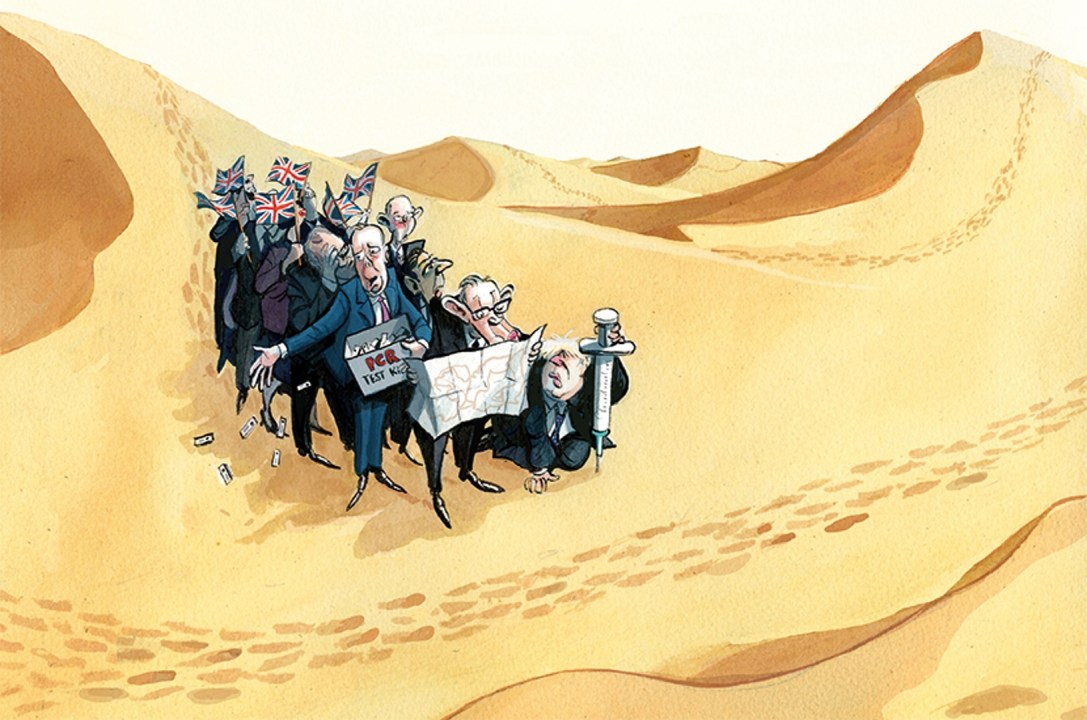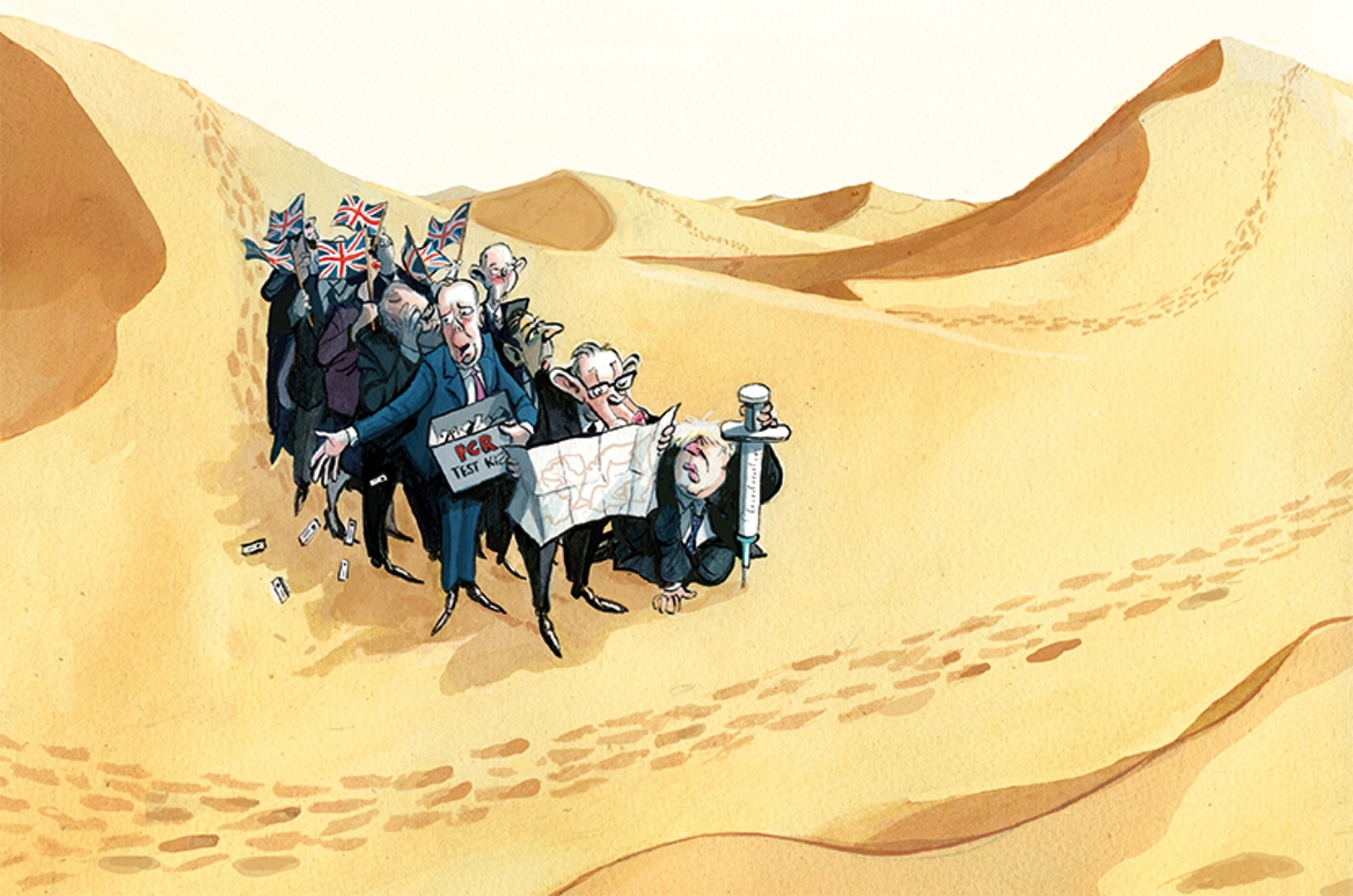It seems almost certain that ‘freedom day’ will be delayed. So now we consider the details. On the latest episode of Coffee House Shots, we debate the implications of extending restrictions and what that would mean – not just for the summer – but for the rest of the year.
Fraser Nelson makes the case for caution on the podcast (and on Coffee House here), arguing that the Delta variant has changed the equation and the PM should be given the benefit of the doubt, as well as a little more time to get a ‘reasonable grasp of the risks and trade-offs.’ There was broad agreement between us that the issue isn’t so much the date itself. If the government wants to be extra confident that the link between infections and hospitalisations has been broken by vaccines – so it can reopen society confidently and in a big way – pushing back to 5 July might be the sensible thing to do. A delay could be made even more tolerable if several more exemptions were brought in, say for weddings, to acknowledge the unfairness of asking people – yet again – to cancel one of the most important days of their life (and probably the most meticulously planned too).
But I’m inclined to highlight what’s at stake. A delay is not just a minor change to the roadmap. An additional week, two weeks, or month of restrictions does not exist in some bubble in time: it comes after fifteen months of lockdowns, circuit-breakers, red tape around park benches and laws dictating who you can and cannot host in your own home. Last March it was three weeks to ‘flatten the curve’; now we’re preparing to be told it’s a matter of weeks to return to normal. There’s more than a year in between these promises; for plenty of good reasons, but let’s not play down just how long our lives have been put on hold.
Yes, we can cheer ourselves up with a socially distanced trip to the pub or a meal out with a few friends. Life is much better now than it was at the start of the year. But it’s not real life. Everywhere we go, we get our Covid reminders: masks, social distancing rules, one way systems so – goodness forbid – you never come into contact with a stranger or meet someone new.
It’s becoming all too common to suggest life is basically back to normal. This is really a comment on one’s personal situation: yes, many people are now able to take part in the activities that they most enjoyed before. But for others, often younger people who are not yet settled down in a routine or who still want to expand their social circle, the bigger events and jammed-packed celebrations that they love are still off limits. In a free society, we care about everyone being able to live their lives as they want, including the minority. The fact that many still can’t is a good indication that we have not returned to our pre-crisis way of life.
These are just some concerns over delaying 21 June under the best circumstances, in which it is another week or two before restrictions are scrapped and we’re allowed to go free. But I fear there are much bigger risks attached to a delay: if a bid to buy more time is the best case scenario, the watering down of the roadmap’s endpoint – the restoration of freedom – is the worst. And there are signs that this may already be underway.
Throughout the crisis the government has never been transparent about the criteria it weighs up to make decisions. We know the original goal: to keep hospitals from being overwhelmed. But quickly this goal became muddled. Infections, hospitalisations and deaths have all been part of the government’s calculations, we know, when deciding on the tier system, lockdowns and easing, but specific criteria and thresholds have never been laid out. As a result, areas like Leicester were essentially under lock and key for months on end, with no meaningful understanding of what the data needed to reflect to be let out.
We are facing the same problem now on a national scale. Vaccines, we were told, were the path to freedom. And this data reflects Britain’s overwhelming success: all of Britain’s most vulnerable have been offered the vaccine. While we’ve fallen a few days behind from the goal of 21 June, we’re still on track to give all over-50s their second jab by the end of the month. Nearly 80 per cent of the adult population is estimated to have Covid-19 antibodies, thanks to a highly efficient vaccine rollout.
But the language has changed. The Prime Minister and his officials have taken to talking down the efficacy of vaccines, as a way to keep people following the rules. The emphasis has switched from hospitalisations to infections, which are likely to keep rising for some time as activity picks up. The question should be whether or not this results in severe illness (in this week’s cover piece for the magazine, Professor Philip Thomas’s modelling suggests even a surge in cases should be manageable in the NHS now).
Nadhim Zahawi, the vaccines minister, is now raising concerns about oxygen supplies for young people, who are very unlikely to die from the virus but may need some extra medical support. It’s an important consideration, but a great distance from his fellow cabinet minister Matt Hancock saying in January he would ‘cry freedom’ once the vulnerable were protected; or Grant Shapps pledging to join ‘the barricades to get our freedoms back’.
Again it goes back to supplying the public with critical information: what metrics are they really following to lift restrictions, and why do they keep changing? We are in dangerous territory of being equally restricted this summer, or in some ways more restricted, than we were last summer, when we did not have a single vaccine approved. International travel looks almost certain to be more limited for some time: last year’s ‘green list’ allowed for admin-lite travel to dozens of destinations. This year’s list is smaller, excludes other vaccinated countries and includes countries that won’t let us in.
But we are also in danger of abandoning a return to normal all together. In April this year I questioned in this magazine where the PM’s roadmap was really leading: could it actually be taking down a path to a ‘new normal,’ where the way we used to live life is deemed too care-free? The updates since have not been comforting. There are already discussions taking place in Whitehall about bringing back restrictions this autumn, when the NHS will be close to breaking point as it is every year, without the additional burden of Covid.
Meanwhile the biosecurity state is creeping in: while ministers oscillate over vaccine passports, the Euro 2020 organisers have gone ahead and introduced them regardless. To enter Wembley for the matches, all attendees are required to show proof of vaccination or present a negative Covid test. There’s no longer even a pretence of involving Parliament in these decisions.
Nothing is certain when it comes to Covid. If worst-case scenarios arise – a horrible revelation about vaccine efficacy, or a vaccine-dodging variant emerges – then calculations will change. But we must know what’s being calculated: that is, what specific data is holding back a full reopening and the risks associated with it. Are the right trade-offs being made? If we delay the 21 June without this information, it will only become harder to argue for the return of our freedoms as the summer continues.








Comments